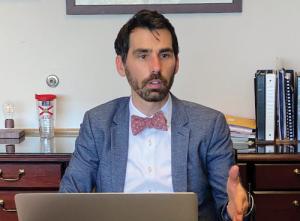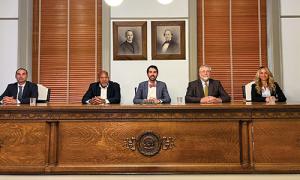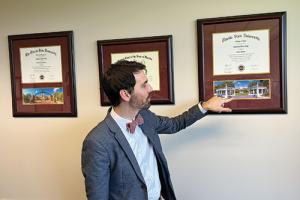State Commissions
Andrew Fay is Chair of the Florida Public Service Commission.
The Florida Commissioners these days are busy, grappling with the tough subjects of utility ratemaking in the public interest, but also population growth and ensuring all those residents, old and new, have reliable utility services. Enjoy these conversations with Florida Chair Andrew Fay, and Commissioners Art Graham, Gary Clark, Mike LaRosa, and Gabriella Passidomo.

PUF's Lori Burkhart: How did your background lead you to the Commission?
Chair Andrew Fay: My original appointment to the Commission was in 2018. At that time, I was serving as an Assistant Attorney General, working on multistate litigation and advocating for the Attorney General's legislative priorities. We successfully worked with the Legislature to reform Florida's False Claims Act, enhance a series of criminal justice provisions, and pass a data breach statute known as the Florida Information Protection Act.
That time spent in the Attorney General's Office molded my ability to work with a wide array of interested parties on complex legal issues. I also had the opportunity to work on Florida's Siting Board Act, which was my first real exposure to the energy sector.
The energy-specific work sparked my interest in the Commission because of how far-reaching the Commission decisions can be. People think about highly regulated industries like education and healthcare, but none of those industries work to their highest potential without reliable energy. It's a core component of almost everything we do.
 Sitting inside the Historic Florida Capitol on the celebrated golden oak bench used in Florida Railroad Commission times. From left, Commissioners Mike LaRosa and Art Graham, Chair Andrew Fay, Commissioners Gary Clark and Gabriella Passidomo.
Sitting inside the Historic Florida Capitol on the celebrated golden oak bench used in Florida Railroad Commission times. From left, Commissioners Mike LaRosa and Art Graham, Chair Andrew Fay, Commissioners Gary Clark and Gabriella Passidomo.
PUF: The Chair has administrative duties, and you are also a Commissioner, how do you decide what to prioritize in your busy schedule?
Chair Andrew Fay: The Chair is a role I absolutely love. In Florida, the biggest difference between Commissioner and Chair is that as Chair you oversee all the administrative responsibilities. With an agency of over two hundred employees, that can keep you very busy.
The administrative work is a large part of the Chair's role, and it's something Chairs don't talk a lot about because our days are already filled with reviewing dockets and preparing for hearings.
I believe that being deliberate and thoughtful, about even the smallest administrative details, is where a lot of the success in the role can come from.
 Chair Andrew Fay describes his alma mater, Florida State University.
Chair Andrew Fay describes his alma mater, Florida State University.
I did have the opportunity to reach out to other Commissioners around the country to discuss the Chair role within their Commission. What started as a handful of calls, ended with discussions about the Chair role with all fifty other state utility commissions. The process took longer than I expected, but now that I am Chair, I believe it was the best thing I could have done to prepare myself for this role.
It shows that state utility Commissions are some of the best at sharing information to help other Commissions succeed. I'm so grateful to these Commissioners for all of the guidance they provided me.
PUF: Generally, how did the Florida Commission deal with the effects of the pandemic on consumers?
Chair Andrew Fay: Honestly, better than I could have imagined. This is an example where having good IT and support Staff can determine your success as a Commission. We had to move most of our employees to virtual operations, then to hybrid, and we have since transitioned back into in-person hearings with few issues.
As to your question about consumers, we had rate cases filed by four of our largest utilities during this time, so we had to make sure customer meetings were accessible to those ratepayers, among other issues.
In those four dockets alone you're looking at a direct impact to over sixteen million Floridians. That means you're going to get more feedback when you have rate cases and other issues coming up, with more people commenting and weighing in.
What we adapted to well, and is something we're considering going forward, is allowing customers to provide comments about a rate case virtually, if they can't do so in person. It can be challenging to get all the logistics right, but that adaptation during the pandemic served us well because we were able to give those who weren't able to travel an opportunity to speak.
We eventually transitioned to having people back in the office, respecting those who require extra care or were extra sensitive to the situation. I've had folks call me from other states to ask how we transitioned back as quickly as we did. I didn't fully appreciate what we navigated until I got those calls.
We also took a comprehensive look as to how our website could be improved to allow for a better point of contact for consumers. We found that it wasn't a question of whether we have the right information online, but more about how easy it is for consumers to access that information.
The pandemic expedited this review, and we are now in the middle of updating our entire website.
Interactions between Commissioners didn't change much, as we can't discuss any docket-related issues unless it is at a publicly noticed meeting. It was still challenging not being able to see my colleagues. I respect them as Commissioners, but I also consider them friends.
PUF: You said with the docketed cases, you can't talk about them with other Commissioners. Is it ex parte rules?
Chair Andrew Fay: We do have ex parte prohibitions where, as Commissioners, we can't discuss anything docket-related with a party. We also have Sunshine Law prohibitions on discussing anything docket related with any of our fellow Commissioners. We have to work independently to educate ourselves about a docket and can only discuss or debate the issues in a properly noticed public meeting.
I have found that the more time I put into understanding all the details of a docket, the better positioned I am to comprehend a new position presented by one of my colleagues. We all try to make the best decision we can, and if there's somebody who has a different perspective than I have because of their experience, that might impact the decision I make. That is why our hearings are so critical to getting the decision right.
PUF: What are some of the important issues the Florida PSC is dealing with right now?
Chair Andrew Fay: Just like any Commission, we have rate issues or rate cases. We dealt with a few of those last year and have two more that have been recently filed. We also have some common goals as a Commission to strengthen our grid against hurricanes, while also improving our restoration process after storms.
Cybersecurity is an issue that state and federal regulators need to continue to look at. Although the bulk power grid falls within the federal purview, states can have a role. The hardest part about working on cybersecurity is the limitation on discussing grid protections in public.
We never want to insinuate that, as a state, we are more protected than any other entity because you may unintentionally invite an attack on your state's grid. I am probably even more sensitive to this because of the large military presence in our state.
I am also a big advocate for electric vehicles. Florida is second in the country in electric vehicle adoption, which is something I am proud of. We still have a long way to go, but the wildfire evacuations from last year taught us how important it is to have charging infrastructure along Florida's evacuation routes.
Because of hurricanes and storms, we want to have charging infrastructure that allows people to evacuate if needed, which means making chargers easily accessible from our highways. We have seen significant investment from the state level, but more recently we are also seeing investments increase from third parties and utilities.
One other issue I am extremely passionate about is improving the access of telecommunications services for people with a speech or hearing disability, also known as relay services. Our job is to make sure that those new services and devices are accessible to those in need. As a government agency, we need to make sure we don't stand in the way of that progress.
PUF: Talk about Staff, how they help you, what you can or can't say, and how you interact.
Chair Andrew Fay: Our Staff makes formal recommendations to the Commission without any input from Commissioners. They brief each of us on the information separately, and then we review the recommendation and make a decision to accept, reject, or modify the recommendation.
I know I can be slightly annoying to Staff, as I never hesitate to ask questions, but my experience is those questions are always met with an eagerness to get me the right information. It's not to persuade me as to any decision one way or another, but to make sure I have the information that I need to fully understand an issue and my decision.
PUF: Do you find more cases are getting appealed?
Chair Andrew Fay: I don't believe so. I can't speak to before I was appointed, but since I've been here, it's been fairly consistent.
My position has been, which can mean additional workload on our Commission, that we are not here to disincentivize the legal options provided to the parties. If they want to appeal a decision, they are legally entitled to do so.
The ability to intervene and the other procedural rules are there for a reason. If a decision the Commission makes is challenged, that's a check on the Commission to make sure decisions are made consistent with the implementing statutes.
All government should have a check on it, and I don't believe that utility Commissions are an exception to that principle.
When people ask me what drives me as a Commissioner, it's the statutes. The legislature sets what we're supposed to do. Those statutes are our primary directive.
When a Commission doesn't abide by the operating statutes, that's where a court may say we've exceeded our legal authority and send it back. Since I've been here, I've ruled on over five hundred dockets, and I am proud to say that not a single decision has been overturned by our courts.
PUF: Talk about your work at NARUC and why that's important.
Chair Andrew Fay: NARUC is proof that not all of the education we need as Commissioners is found in a book. I am a better Commissioner, Chair, and regulator because of the influence that NARUC has had on my education and leadership development.
I'm sure I will forget someone, but President Nick Wagner appointed me to the Education and Research Subcommittee. President Paul Kjellander put me in charge of NARUC Rate School.
President Judith Jagdmann just appointed me as a Vice Chair of the Committee on Critical Infrastructure.
The list goes on with leaders in this industry who have given me an opportunity to become better informed and engaged in the issues I am passionate about. I honestly don't know how to properly thank them for this trust they put in me, other than trying to carry out these roles to the best of my abilities.
At the heart of it all, NARUC is better educating Commissioners and Commission Staff by providing the resources we need to succeed. There is truly something special with this current group of NARUC leadership. To have three presidents align their agendas, and provide some continuity going forward, will benefit all of us.
PUF: What do you hope to accomplish in your time as Chair?
Chair Andrew Fay: On my first day in the office as Chair, I gave our executive director five priorities to accomplish during my time in this role. We were already able to implement some of these priorities, but others may not be finalized until the completion of my term.
One thing we've done quickly, with my colleagues' support, is we've been more transparent about the way we present agenda items in our Commission meetings. This does create some additional work for Staff, but now every item placed on our agenda is presented to the Commission in a public meeting.
I believe that even if the docket is straightforward, and might just be some basic annual reporting, it should still be presented publicly. If somebody is interested in a docket, they can at least watch the meeting and better understand the decision we're making. It allows the consumer to be more engaged in the process.
The website rebuild is also something I want to get to the finish line. I'm hopeful we get done by the end of this year. Our IT and comms shop are probably tired of me already, but the more detail and thought we put into how we're presenting information to the public, the better the final product will be.
PUF: Where do you see the energy and utilities industry in Florida going in the next five or ten years?
Chair Andrew Fay: We are going to see a much smarter and diversified grid in Florida. We have already seen renewable generation double since 2018, and I expect that rapid pace to continue.
We are also going to see a more resilient grid with continued investments in storm hardening. We have to accept that we are going to continue to see hurricanes hit our state and be proactive about what we do to increase resiliency.
When I look at reliability data nationally, and at what our utilities have done, Florida sits in the top five as to grid reliability, even when you include the impacts from our hurricanes. That's impressive.
We can see data with those events, see the response times, and how well they're able to get the grid back up. But it doesn't mean we should let up. Customers still have high expectations that their power will remain on even during storms.
We are going to see the support in the markets for the companies that invested in renewable energy. As costs continue to decline, and consumer interest continues to grow, we will continue to see energy portfolios diversified with this type of generation.
Florida PSC Conversations:


